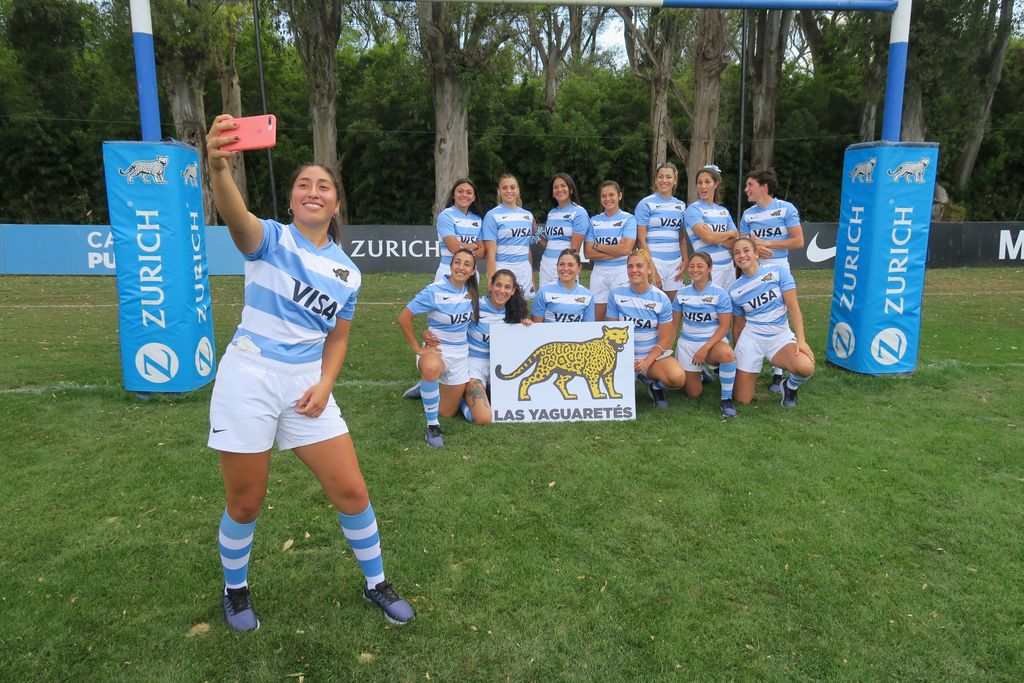The Argentine women’s new name - Las Yaguaretés - was unveiled this week ahead of the Sudamérica Rugby Sevens.
When the Argentina Women’s Sevens team takes to the field for the Sudamérica Rugby Sevens on Friday, it will be with their new nickname: Las Yaguaretés.
The story goes that when Argentina’s men first toured internationally in 1965 to Rhodesia - now Zambia and Zimbabwe - and South Africa, a local journalist in Salisbury, the then capital of Rhodesia, asked them what he should call the team. ‘Yaguareté’ (jaguar), the animal adorning their emblem and their then-nickname, was tricky for English-speaking journalists to work with – thus, ‘Los Pumas’ were born.
It may have taken 56 years for the women’s team to get its own nickname, but that’s only because women’s rugby is still a growing part of the Argentina rugby landscape. It is, however, growing at a rapid pace.
Since the women’s game made its international debut in the first Sudamericano de Sevens in 2004, the number of registered women’s players has increased by 121% in the last five years.
Currently, there are over 6,000 registered players in the country, with 5,200 of them aged over 15.
This positive growth will now be boosted further by the team’s new name, Las Yaguaretés, or ‘the Jaguars’.
The name comes from the biggest feline in South America. As the Unión Argentina de Rugby explains, “its imposing figure, strength and spirit make the Yaguareté a species of high cultural value for many South American countries.”
¡Bienvenidas, @lasyaguaretes!
— Unión Argentina de Rugby (@unionargentina) November 8, 2021
Este hito, impulsado desde la UAR, se produce en el marco del crecimiento sostenido del #RugbyFemenino en nuestro país. Cada día se suman más mujeres que eligen este deporte, como parte de un movimiento que también se expande a nivel mundial. pic.twitter.com/PjxxbITvl6
Captain Gimena Mattus is delighted to be taking the Yaguaretés to Uruguay and is aiming for a place in Rugby World Cup Sevens 2022.
“Having a proper name enhances the personality of the team. We have been working for years, with clubs from the interior of the country putting in a massive effort and sacrificing a lot”.
“The name is a big leap for our identity. It is something very important for our women's rugby. The name adds new value to our personality and a distinctive feature to our jerseys, which will project us nationally and internationally.”
Argentina’s preparation for SAR 7s was not ideal, but they did have the opportunity to play in the Olympic Repechage in Monaco earlier this year, giving coach Tomás Bongiorno some game time.
“Despite the pandemic, we took positive steps. Now the goal is to ensure qualification for RWC Sevens,” he told World Rugby.
“We are confident because we worked hard; we could have done with one more camp, but we will be ready to take to the field.”
The growth of the women’s game in the region’s leading country is such that the goal for 2021 is to have an academy system organized in five of the biggest cities – Buenos Aires, Córdoba, Tucumán, Mendoza and Rosario – where 40 players will be able to train in a High Performance environment.
“You can feel the growth of the game. I was at the National Championship and the standard was the highest it has ever been. Not only in the standard of rugby, but in player physique, ability, growth, etc,” adds the coach that joined the team in 2019. “The academies will strengthen this.”
Argentina Sevens finished fifth in last year’s SAR 7s, their worst finish ever. It was a team lacking experience but selected based on how committed players were to match preparation during the worst COVID-19 period.
This year, Las Yaguaretés will have three debutants: 18-year old María Celeste Pezzella Espina, a strong speedster that will be used as a winger and prop, scrum-half Ángela Juárez, a player with a strong X factor, and Dolores Berti, from Mendoza.
With two places up for grabs for RWC Sevens 2022, both finalists will advance to next year’s tournament in Cape Town.
Las Yaguaretés will play in Pool A with perennial winners Brazil, Uruguay, Costa Rica and Guatemala. Avoiding As Yaras in the semifinal might be a blessing in disguise for Las Yaguaretés.
READ MORE: England pull further clear in World Rugby Women’s Rankings powered by Capgemini





